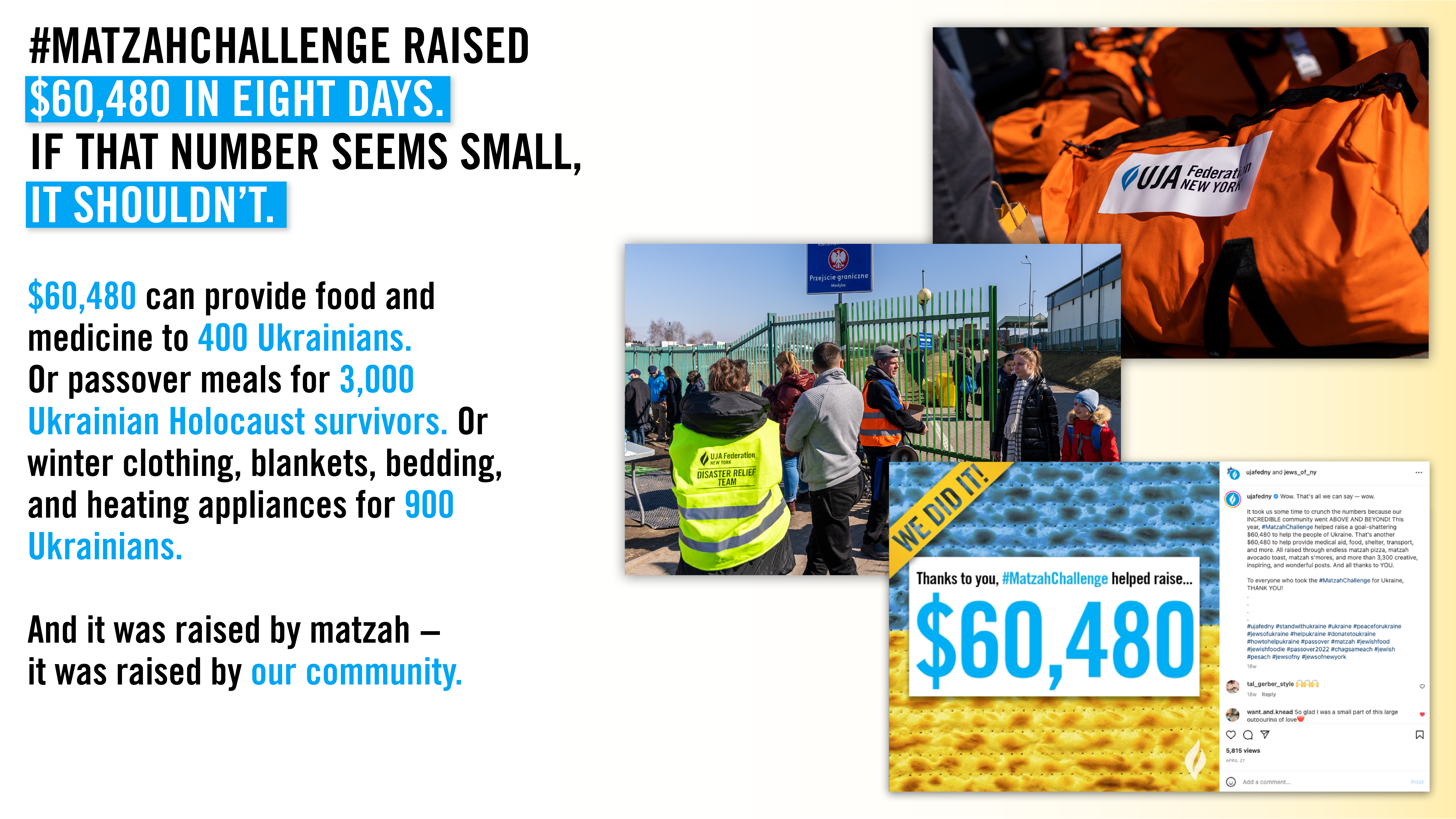
A different kind of war. A different kind of Passover. A different kind of #MatzahChallenge.
When we started #MatzahChallenge in 2018 — then a finalist in User Generated Content — we wanted to connect with Jewish New Yorkers during Passover, the most celebrated Jewish holiday in America — while helping them do some good.
The idea was simple: harness the Passover “food porn” people were posting anyway. Our audience just needed to snap a pic of their matzah and share on social media with the hashtag #MatzahChallenge. Each photo would unlock $18 — thanks to the generosity of matching donors — to support our work caring for Jews everywhere and New Yorkers of all backgrounds.
Since 2018, more than 9,000 #MatzahChallenge posts have helped raise more than $167,000.
While preparing for another business-as-usual #MatzahChallenge, Russia invaded Ukraine. UJA immediately acted, allocating millions of dollars to provide humanitarian aid with our partners on the ground. But our community ached to do more. With one of the largest Jewish populations in Europe, thousands of Holocaust survivors, and hundreds of Jewish orphans — and deep ancestral ties to the region — the suffering hit close to home.
So we pivoted, and the #MatzahChallenge for Ukraine was born.
Our goal was to raise $50,000 over the eight days of Passover (April 15 – April 23) for our crisis response fund while raising awareness of our humanitarian aid efforts for the people of Ukraine — and providing our community with a tangible way to help.
We started with a simple call to action: if your heart is with Ukraine, take the #MatzahChallenge, and every post will unlock $18 toward humanitarian aid for Ukraine — then challenge a friend or two. The more you post, the more people we can help.
And our community was galvanized like never before.
To spread the word, we used paid social media ads and media placements that performed incredibly well. Ads had 632.8K impressions, nearly 19% higher than the 2021 #MatzahChallenge.
The timing of Passover itself presented a significant challenge: because of holiday observance, and when Passover fell, we couldn’t post for half of the campaign. Meaning we had to optimize our time in market and strategize around these hurdles. In other words, we needed to double our impact in half the time.
A key way we accomplished this was relying on a comprehensive influencer strategy to generate and sustain the momentum of our campaign. With Instagram’s new co-posting feature, our page could showcase a steady stream of original videos and images from participants when we couldn’t post ourselves. Thanks to co-posting, we reached over 500,000 people from our 80+ co-posts, an average reach of 7.2K people per co-post. That’s 3x our average reach. Per co-post, at least 50% of those reached were new to our Instagram page. We gained more than 1,000 followers throughout the eight days of #MatzahChallenge. According to M&R Benchmarks, that’s more than most nonprofits achieve in a year.
By partnering with more than 300 influencers, literally millions of people were exposed to #MatzahChallenge on Instagram, Facebook, Twitter, and TikTok. Because people felt so connected to the cause, several major influencers posted pro bono, while others reached out to become more involved with our work throughout the year. Celebrity chefs caught wind of it and participated, like Eitan Bernath, who took the #MatzahChallenge on TikTok before his 2.3 million followers. Celebrity chef Michael Solomonov challenged Andrew Zimmern, host of Travel Channel’s Bizarre Foods, to take the #MatzahChallenge, and he did — sharing #MatzahChallenge with his one million followers.
But it wasn’t just influencers who participated — the heart of #MatzahChallenge comes from our community. In just eight days, participants uploaded more than 3,300 posts. And #MatzahChallenge went global, with participants posting from Japan, France, Germany, Australia, UAE, Argentina, and Israel. Some participants took the no posting limit to heart — one woman uploaded 100 unique posts, unlocking $1,800 for humanitarian aid.
Another feature of our campaign was highlighting our ongoing work in Ukraine beyond #MatzahChallenge. While our typical engagement rate is above industry benchmarks, engagement on posts during this period was nearly 2x higher than our average. In addition, several participants new to our organization donated directly on top of posting.
Simply put: #MatzahChallenge for Ukraine deserves to win because this campaign was a prime example of organizational agility to meet the moment. People wanted to help and to know they were doing good, and with #MatzahChallenge for Ukraine, they could. And they did.
For #MatzahChallenge, our goal was to raise $50,000 in eight days for humanitarian aid for the people of Ukraine.
We achieved so much more, raising a goal-shattering $60,480 while reaching millions of users, all to help the people of Ukraine through the tenacity and enthusiasm of our community and participants worldwide, who shared more than 3,300 posts.
If $60,480 seems small, it shouldn’t. It’s $18,000 more than our 2021 #MatzahChallenge and more than 3x what we raised for the first #MatzahChallenge in 2018. More importantly, it’s $60k+ raised by the broader community on top of the tens of millions raised by our major donors — allowing more people to make an impact. All to help provide medical aid, shelter, transport, and more for the people of Ukraine.
$60,480 can provide:
We also consider the response from our community a success. Our community felt deeply connected to this year’s #MatzahChallenge — we received comments like, “So glad I was a small part of this large outpouring of love” and “So proud of our beautiful community for stepping up and making a difference.”
While we hoped this campaign would galvanize the community for a discrete moment in time, as the war rages on, the social echo of the campaign continues to give our work lasting, powerful relevance. And our community continues to provide ongoing lifesaving support.







